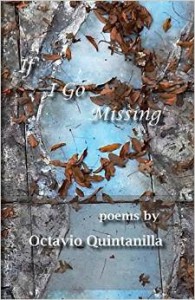
If I Go Missing
by Octavio Quintanilla
Reviewed by Luis Martinez
There is a darkness driving the current in Octavio Quintanilla’s debut collection, If I Go Missing, and I’m standing by the edge wondering what would happen if I dove in. I want to. Perhaps, I’d too admit myself a fond admirer of the butcher as the speaker in the first poem of the collection, The Left Hand, “Last night, it (my hand) got chopped clean/by a butcher’s knife, weird/ because as a boy I admired butchers/ and liked their knives.” In the same poem, Quintanilla explores what our hands are called to do, as they constantly force us out of our selves:
the dream in which I lose my left hand
doing a job I wasn’t born to do.
Sometimes I’m picking trash
on the side of the highway.
Other times, I’m saving a drowning man.
Darkness drives the current. “Revise toward strangeness,” is probably some of the best advice I’ve received as a poet. Poems that do so, often have beautiful endings: “And the night returns, and so does the river,/ and the hand that rides the current/ to the ocean/ and refuses to drown.”
In Tough Guy, the speaker notes, “When drunk, he pours milk/ between the legs of a beautiful girl,/ and licks.” Nourishment through artificiality. Something I fell in love with because how many times do we labor to find substitutes for things that already serve us pleasure. Quintanilla delivers a new strangeness. Images are released, “like frightened birds/ out of their cages.” This is book you’ll take orally, touch your lips, stare at your fingertips, bring them to your nose and get a taste of the beautiful unfamiliar.
One of the many things I like from this collection is that this isn’t a book about one thing. Not a project book. You won’t read the same poem over and over in different forms. It displays enviable range, from poems about fatherhood, immigration, love, death, and class. He’ll tell us about love, in Tell Them Love is Found, “Tell your mother about us…Tell them that I’ll keep returning to this house/ And gently take what is no longer theirs,” then he’ll spell poverty, “Now we are going somewhere./ Let us rejoice, then, and remember the days/ when our tongue was the only meat/ we could bite into.” Read this and learn the beauty tucked under the everyday.
